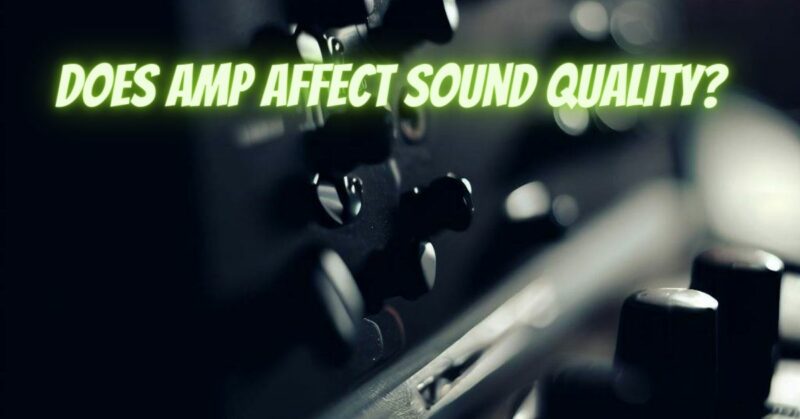In the world of audio equipment, amplifiers play a crucial role in shaping the sound you hear. But do amplifiers really affect sound quality, and if so, how? This article delves into the intricate relationship between amplifiers and sound quality to help you understand their significance in your audio setup.
The Basics: What Does an Amplifier Do?
An amplifier, in its most fundamental form, increases the amplitude or volume of an audio signal. It takes a weak input signal and amplifies it to produce a more potent output that can drive speakers or headphones. While this function may seem straightforward, amplifiers can influence sound quality in several ways.
- Amplification Accuracy: The primary goal of an amplifier is to accurately reproduce the input signal without distortion. High-quality amplifiers are designed to do this faithfully, ensuring that the output matches the input, preserving the integrity of the sound.
- Power Output: Amplifiers are rated by their power output, typically measured in watts. An amplifier with insufficient power can lead to distortion when trying to reproduce loud sounds, impacting sound quality. Conversely, an overpowered amp may cause damage to speakers or headphones.
- Signal-to-Noise Ratio (SNR): The SNR measures the ratio of the desired audio signal to unwanted background noise. A good amplifier minimizes noise and interference, contributing to better sound quality, especially at lower volume levels.
- Distortion and Harmonics: Amplifiers can introduce distortion and harmonic content to the audio signal. High-quality amps are engineered to minimize these unwanted artifacts, ensuring a cleaner and more accurate sound reproduction.
- Tonal Characteristics: Some amplifiers, particularly tube amplifiers, are known for their unique tonal characteristics, which can color the sound. Musicians and audiophiles often appreciate these tonal qualities as part of their artistic or listening experience.
Factors That Impact Sound Quality
- Amplifier Quality: The quality of components, circuit design, and overall build quality can significantly impact how an amplifier affects sound quality. High-end amplifiers tend to provide a more transparent and accurate audio reproduction.
- Matching with Speakers or Headphones: The compatibility between your amplifier and speakers or headphones is crucial. Mismatched components can lead to suboptimal sound quality or even damage. Ensure your amplifier’s power output matches the requirements of your audio equipment.
- Source Material: The quality of the audio source, such as the format and recording quality, can have a more substantial impact on sound quality than the amplifier itself. A high-quality amplifier can reveal flaws in poorly recorded music.
- Room Acoustics: The acoustics of your listening environment play a significant role in sound quality. Even the best amplifier can’t compensate for poor room acoustics, so consider room treatment to improve your listening experience.
In summary, amplifiers do affect sound quality, but the extent of their influence depends on various factors, including amplifier quality, power output, and matching with speakers or headphones. High-quality amplifiers, designed to faithfully reproduce audio signals with minimal distortion and noise, can enhance your listening experience significantly.
When evaluating amplifiers, consider your specific audio needs, preferences, and budget. Whether you’re an audiophile seeking sonic purity or a musician searching for the perfect amplifier for your instrument, understanding the role of amplifiers in shaping sound quality is essential in making informed decisions for your audio setup. Remember that a balanced combination of quality components, thoughtful setup, and an understanding of the strengths and limitations of your equipment can lead to the best possible sound quality in your audio journey.


